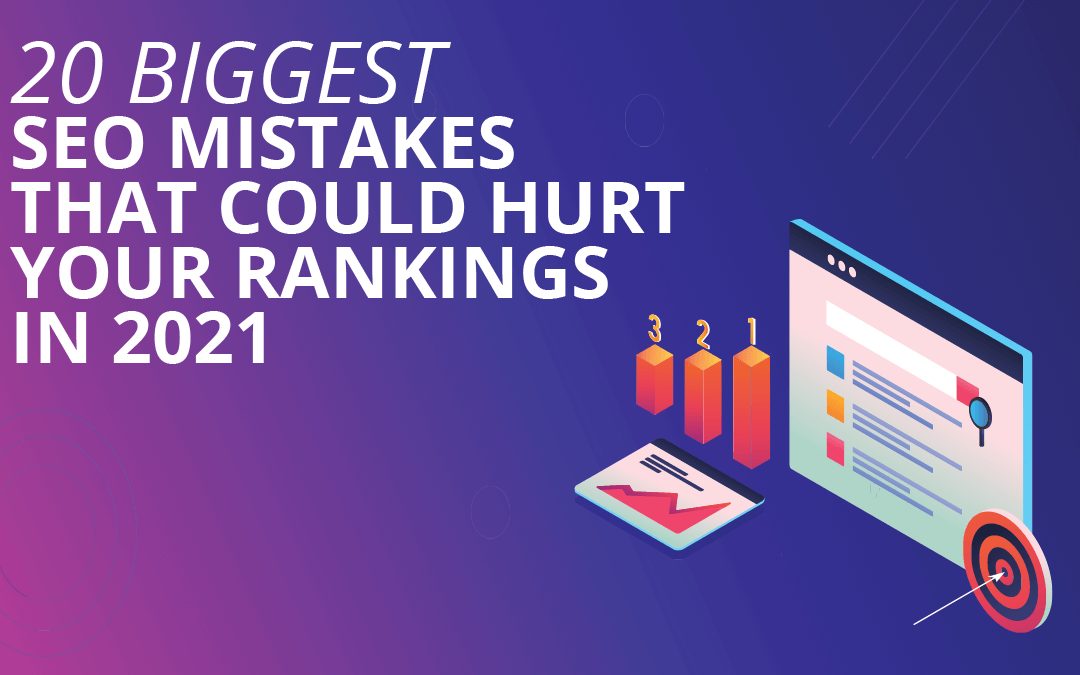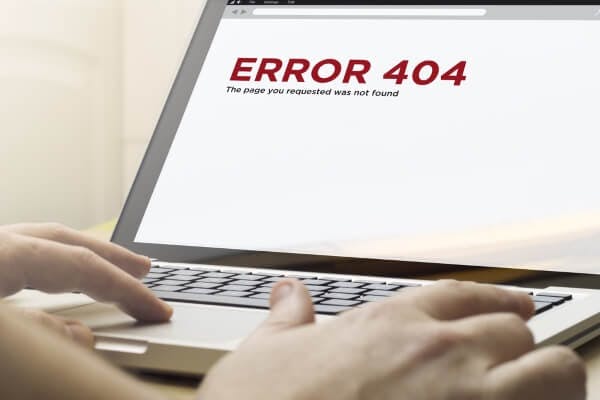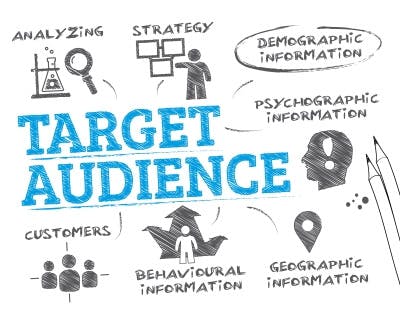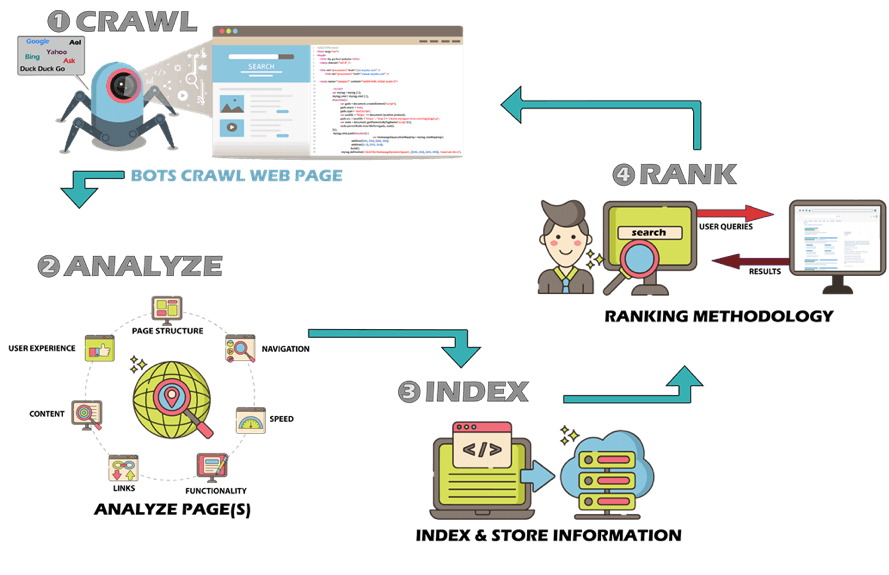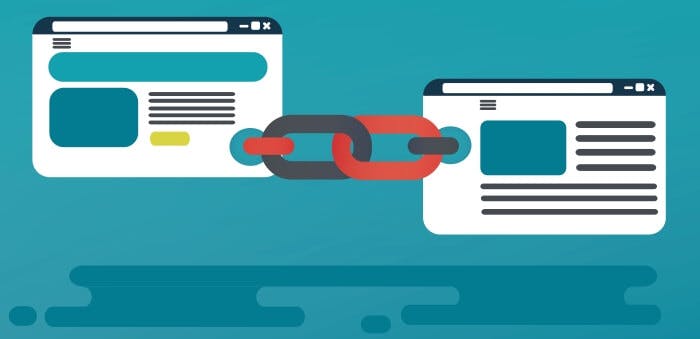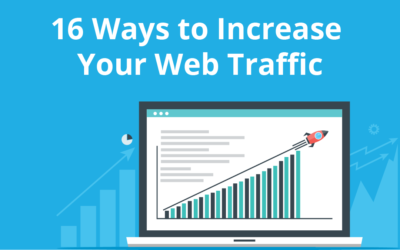SEO is a critical piece of today’s marketing budget. In fact, the SEO Market has reached $80 billion annually in spending and will continue to grow as a significant revenue channel.
With the breakneck speed of technology, changes and adjustments often occur in how SEO works. Perhaps one of the most significant announcements regarding SEO changes from Google centers around the Page Experience Update.
The Page Experience Update is based on Core Web Vitals, which measure the speed and usability of a web page. It confirms that user experience will become an SEO ranking signal during 2021. SEO methods are continually evolving.
This is due to changes in consumer behavior and new developments in search engines. Preparing for the coming SEO changes is vital, as is determining what SEO mistakes you may be currently making. Take a look at your website to determine whether your site is making any of the following 20 SEO mistakes:
- Your site is not easily accessible.
- The “noindex” tag was not removed.
- The content on your page is too short.
- Your content is long enough, but it’s not the content your audience wants.
- The content you are publishing is not original.
- Your AMPs (Accelerated Mobile Pages) are not working correctly.
- You don’t have a good understanding of your target audience.
- You’re flying blind without a solid SEO plan and roadmap.
- You’re working with meta content that is not optimized.
- Your pages aren’t being crawled as they should
- Your headings are “off.”
- Your site is lacking high-quality external links.
- Your internal links have gone awry.
- Your site is not mobile-friendly and/or is too slow.
- You are failing to utilize analytics properly.
- You’ve failed to choose the right keywords.
- You are using the same keyword for more than one page.
- You are ignoring local SEO.
- Your conversions are not being properly analyzed.
- There are pop–ups lurking on your pages.
1. Your site is not easily accessible.
Accessibility is one of the top SEO mistakes out there—issues with indexation and accessibility account for a significant number of all SEO errors. To ensure accessibility, prioritize features like alt text, and prioritize accuracy above keyword density.
2. The “noindex” tag was not removed.
A noindex tag tells search engines not to index your page, meaning you could have the most comprehensive SEO around, and users would still be unable to find your page.
3. The content on your page is too short.
Yes, at one time, shorter was considered better, but today, content is getting much lengthier. Google and other search engines need a minimum of 300 words to work with—longer is even better. In fact, most pages that rank in the top ten have more than 2,000 words. This is not to say words should be added for no other reason than to make a word count, but thoroughly covering a topic is recommended.
4. Your content is long enough, but it’s not the content your audience wants.
When you create content only to rank for a specific keyword, but that content is not actually about your audience, you fail in your SEO objectives. When any of us type in a search query, if the results do not answer our needs, we will quickly go elsewhere. To rank for keywords, sometimes the quality of the content deteriorates, or there is an attempt to fit several topics within a single piece of content. While your content should have high-ranking keywords, even more, it must closely correspond to the needs of your target audience, answering their questions in a straightforward, thorough manner.
5. The content you are publishing is not original.
“Back in the day,” duplicating text was standard. However, today, such practices are penalized by search engines. Never copy content, never plagiarize content, and never duplicate content. Spinning old content into new is simply not worth the toll it can take on your rankings. Make sure your headlines are strong and match your content topic, ensuring the content provides answers and is relatable and engaging.
6. Your AMPs (Accelerated Mobile Pages) are not working correctly.
When you use AMPs, pages will load faster on mobile devices, making the page much more user-friendly. It is important that you not use JavaScript code or CSS stylesheets with AMP—they are not compatible. Also, make sure you remove outdated tags in the AMP document.
7. You don’t have a good understanding of your target audience.
No matter what business you are in, if you don’t have a thorough understanding of your target audience, your SEO will fall flat because SEO is your customers’ voice. How do your customers behave in your specific market? And while you may have a particular understanding in your mind of how your products and services are defined, do your customers have the same understanding?
8. You’re flying blind without a solid SEO plan and roadmap.
Even if you happen to have a solid understanding of your clients and your audience, if you don’t have a solid SEO plan, then whatever you’re doing can come off as random. It is surprising to realize how many businesses lack a specific SEO strategy, which is crucial for success. Take a look at your site now, including the level of results you’re currently getting. Is it where you want it to be? Do you have specific goals? Do you understand your competition? Do you know what tools and platforms will help you meet your goals and help you with workflow?
9. You’re working with meta content that is not optimized.
Meta content or tags describe the contents of a page to search engines. Meta titles should not exceed 11 words, with a meta description of between 150-300 characters.
10. Your pages aren’t being crawled as they should.
This could be because your HTTP status code has an error.
11. Your headings are “off.”
Search engines see headings as a sign of relevance, plus they guide users with short attention spans through your content.
12. Your site is lacking high-quality external links.
Don’t buy your links. Build them organically. Always ensure there are no broken links and use appropriate tools to help monitor the site’s links.
13. Your internal links have gone awry.
Consider your top-performing pages, then place links to them in your content. As with external links, audit your internal links often for broken links.
14. Your site is not mobile-friendly and/or is too slow.
Since more than half of all those who search the internet do so on mobile devices, your site must be mobile-friendly. If your site is too slow, your users will bounce and will not be back.
15. You are failing to utilize analytics properly.
If you’re not tracking your SEO progress, then there is no way to know if it’s working as it should.
16. You’ve failed to choose the right keywords.
Always use a reputable keyword finder, and never use overly-generic short-tail keywords.
17. You are using the same keyword for more than one page.
When you do this, you are, in effect, stealing your own keywords, plus you are forcing your pages to compete against each other.
18. You are ignoring local SEO.
When you do this, you will not rank in your immediate region, meaning you will not connect with local customers. Utilizing local SEO is a must in 2021.
19. Your conversions are not being properly analyzed.
Conversion tracking tools can help you determine which parts of your content leads to conversions—when you fail to convert organically, you are almost certainly losing out on revenue.
20. There are pop-ups lurking on your pages.
Pop-ups are annoying, so use them with care. If you want to notify your visitors about an important event, ensure the pop-up only comes up once when your visitor first enters your site.
Hire an Experienced SEO Firm with a Proven Track Record
To ensure you are making none of these SEO mistakes, UnReal Web Marketing has a systematic search engine optimization program that generates page one rankings every time. Our SEO program has been proven time and time again; our holistic approach integrates research, design, content, structure, links, UX, and analytics. Contact us today for a free health check and ranking report.
Related SEO Articles
The Evolution of Core Web Vitals in SEO: A 2023 Perspective
There are few constants in the ever-evolving landscape of Search Engine Optimization (SEO). Algorithms change, user...
Happy Holidays from UnReal Web Marketing
16 Ways to Significantly Increase Your Website Traffic
You built a website, but few are visiting or returning. If your website traffic is lagging, here are 16 tactics to...

